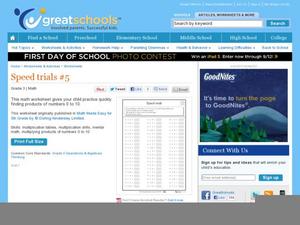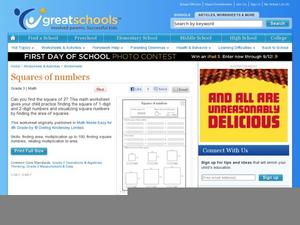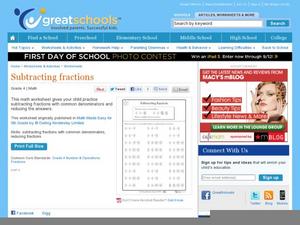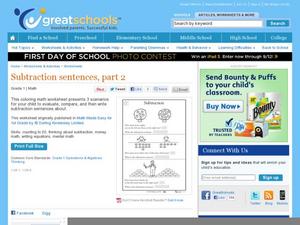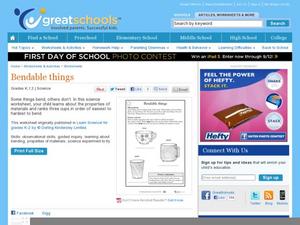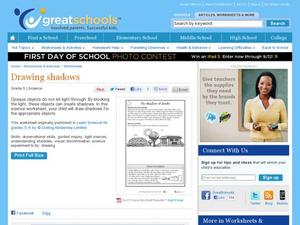Curated OER
Properties of Polygons, Parallel Sides, and Right Angles
Have fun with shapes! Third graders read a set of instructions and circle the shape in the description. They work on recognizing parallel sides and right sides. Use this resource as homework after your geometry lesson.
Curated OER
Measurement Problems
What measurements are shown on these rulers? Learners read eight rulers and record the indicated lengths in centimeters. There are no fraction answers. Remind kids to write the units into the measurements. Extend this by assigning...
Curated OER
Recognizing 3D Shapes, Part 3
Do your first graders know the difference between cones and cylinders? Use this handy activity to help youngsters learn geometric shapes. With prisms, spheres, and pyramids, among others, this resource prompts pupils to identify each...
DK Publishing
Rounding to the Nearest 10
Practice rounding with your third graders using a helpful, straightforward worksheet. After a lesson about rounding to the nearest 10, have your young mathematicians locate ten numbers on number lines, and fill in the correct answer....
Curated OER
Showing Decimals
Introduce decimals to your fourth grade class with a instructional activity that provides four number lines for them to complete. A list of decimals have already been plotted on the number lines; learners only need to label each point....
Curated OER
Speed Trials #5
How fast can your learners solve these 60 multiplication problems? With numbers from 0 to 10, this resource helps your third graders race through three columns of short multiplication drills. Who can finish first? Use this list of...
Curated OER
Squares of Numbers
Test your third graders with a math review instructional activity, which features problems on square numbers and area. After finding the squares of increasingly large numbers (3-40), pupils solve for the areas of six squares. A great way...
Curated OER
Substituting Fractions
Fun with fractions! Fourth graders practice substituting and reducing fractions. The problems contain blank spaces and become more challenging as the activity progresses. Use this as a building block in your fractions lesson.
Curated OER
Subtraction Sentences, Part 2
Take word problems one step further with apples, dimes, and bricks! After reading the word problems, first graders write out the subtraction sentence and solve the problems. For extra practice, bring in different items and have them...
Curated OER
What Time Is It? Part 2
Tell time to the half hour with these analog clocks! The first six problems invite first graders to write the correct times below, while the second set of problems provide the time and empty clock faces. A great way to review your time...
Curated OER
Big, Bigger, Biggest
Which turtle is big, and which one is biggest? Add variety to your third graders' writing with a comparative adjective activity. Given eight adjectives, young writers find the comparative and superlative forms of each. The last two are...
Dorling Kindersley
Punctuation Practice
Need some punctuation practice? Challenge your third or fourth graders' editing skills with a helpful instructional activity on punctuation. After naming different types of punctuation marks, they rewrite a paragraph that has multiple...
Curated OER
Punctuating a Paragraph
Do your fourth graders need a little help with punctuation? Use this run-on paragraph to demonstrate proofreading for capitalization, punctuation, and separating ideas into separate paragraphs. At the end of the activity, learners...
Curated OER
Be Kind to Your Teeth
What kinds of food can be bad for your teeth? Kindergartners and first graders explore dental health with an interactive science inquiry. Given a choice of foods such as celery, cake, and milk, kids choose which ones are better for their...
Curated OER
Being Shadowed
What causes a shadow to appear? Have kindergartners and first graders explore shadows with a fun science activity. After reading a short paragraph about light sources, they draw a shadow for a little girl based on the location of the...
Curated OER
Bendable Things
What kinds of cups can bend? Kindergartners find out with a straightforward science inquiry, designed to teach them about the properties of materials. They hypothesize about the flexibility of a china cup, a plastic cup, and a paper cup....
Curated OER
Day and Night
Expand your third graders' universe with a science activity about Earth's rotation. They read a short explanation about the direction of sunlight, then draw an arrow to indicate which way the sun is pointed at an illustration of the...
Curated OER
No Shadow of Doubt
Fifth graders must use a pencil to draw in the shadows they think will be formed by a house, a greenhouse, and a tree. The sun is behind each of these objects, and an open field is in front of them. That's where pupils draw their...
Curated OER
Good Drugs, Bad Drugs
Add a science experiment on medicine and drugs to your health lesson. After reading a paragraph on the difference between helpful and harmful drugs, kids choose which pictures of bottles they could find at a pharmacy. The last activity...
Curated OER
Bus and Car
Would you go by bus or car on the autobahn? Here, learners use distance, time, and average speeds to investigate the fastest way to get from Berlin to Frankfort for a soccer game. It might be fun to start with a discussion or short video...
James Madison Memorial Fellowship Foundation
A Picture is Worth a Thousand Words
This exercise on the Constitution requires small groups to design a visual metaphor that expresses the concept behind one of seven principles: popular sovereignty, federalism, republicanism, separation of powers, checks and balances,...
Classroom Law Project
What should I watch for in the debates?
Prepare your classes for election year debates with a series of activities that model how to watch televised debates and how to evaluate the moderators as well as the debaters.
Noyce Foundation
Cut It Out
Explore the mathematics of the paper snowflake! During the five lessons progressing in complexity from K through 12, pupils use spatial geometry to make predictions. Scholars consider a folded piece of paper with shapes cut out. They...
Noyce Foundation
Surrounded and Covered
What effect does changing the perimeter have on the area of a figure? The five problems in the resource explore this question at various grade levels. Elementary problems focus on the perimeter of rectangles and irregular figures with...







